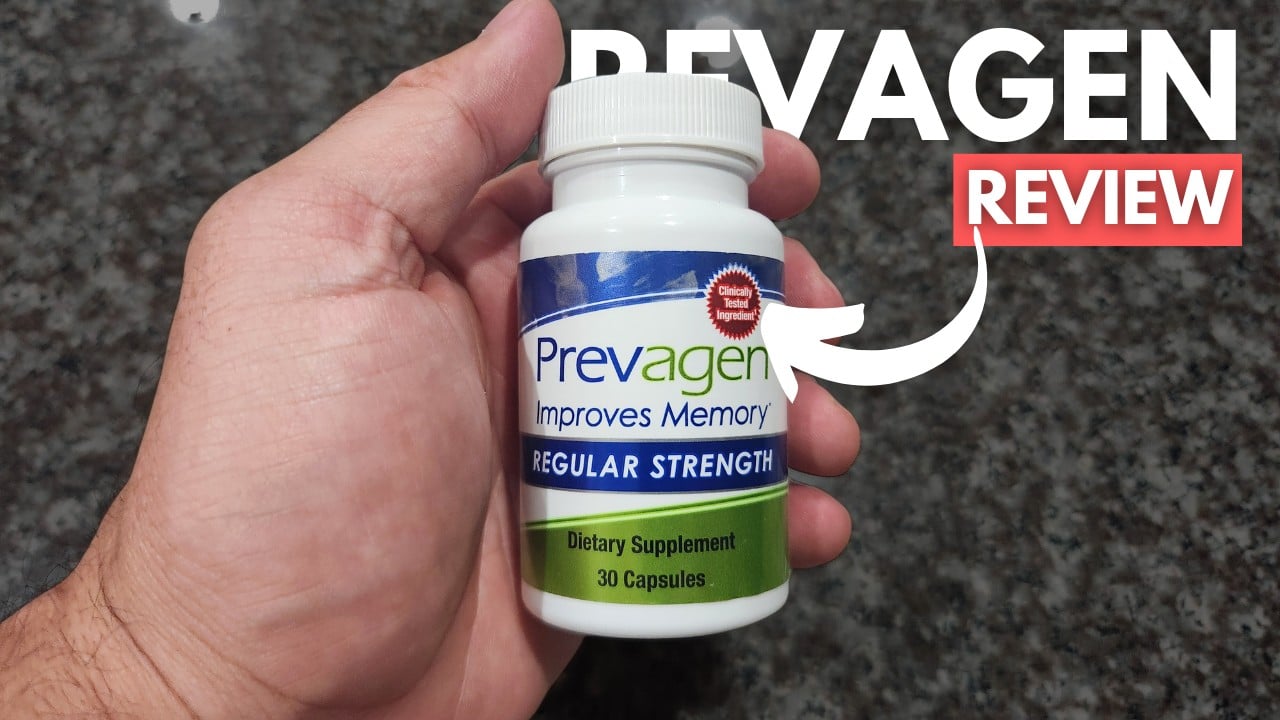I spent three months and $120 taking jellyfish protein pills after forgetting my wife’s birthday, my Amazon password, and why I walked into my kitchen, all in the same week. Prevagen promised clearer thinking and better memory through the power of bioluminescent sea creatures.
What I got was an expensive lesson in why the FTC sued them for false advertising and a newfound appreciation for supplements that don’t come from the ocean floor.
Pros
- No side effects in my experience—didn’t upset my stomach like some nootropics I’ve tried
- Small capsule that’s easy to swallow (unlike those horse-pill multivitamins)
- Available everywhere from CVS to Costco, no sketchy online-only ordering
- The placebo effect is real—just taking something made me pay more attention to my mental habits
- Regular Strength is relatively affordable compared to prescription alternatives
Cons
- The science is sketchy at best—multiple lawsuits and FTC challenges for unsubstantiated claims
- Most neurologists I’ve spoken to say it’s “expensive urine” since proteins get broken down in digestion
- Extra Strength costs $90/month, which is Netflix, Hulu, AND Disney+ money
- Zero effect for the first 30 days (they claim it takes time, convenient)
- The clinical study they cite had only 218 people and was funded by… the company itself
Quick Verdict
While Prevagen has great marketing, it is not a great nootropic supplement. There are far better formulas for a better price.
Our #1 nootropic of choice is Mind Lab Pro. It’s formulated with an effective stack of nootropic ingredients without any stimulants so you can take it any time of day to improve cognitive function in the short and long term.
What Is Prevagen?
Prevagen is a dietary supplement that contains apoaequorin, a protein originally discovered in jellyfish that glow in the dark off the Pacific Northwest coast. Yes, you read that right. Someone looked at bioluminescent jellyfish and thought, “this might help Linda remember where she put her reading glasses.”
Quincy Bioscience, the Wisconsin-based company behind Prevagen, claims their jellyfish protein supports “healthy brain function” and “clearer thinking.” They’ve sold over $165 million worth since 2007, mostly through ads featuring concerned-looking sixty-somethings who can suddenly remember their grandkids’ middle names.
The supplement comes in two strengths: Regular (10mg) runs about $40 monthly, while Extra Strength (20mg) will set you back $60-90 depending on where you shop. They also make chewables and a “Professional” formula that pharmacists keep behind the counter, presumably to maintain eye contact while you buy it.
Here’s the catch: apoaequorin is a protein, and proteins get demolished by stomach acid before they can reach your brain. It’s like expecting a hamburger to improve your muscle tone by rubbing it on your biceps. The FTC actually sued them in 2017 for making false memory claims, though the case was eventually dismissed on technical grounds, not because the science checked out.
Prevagen Ingredients
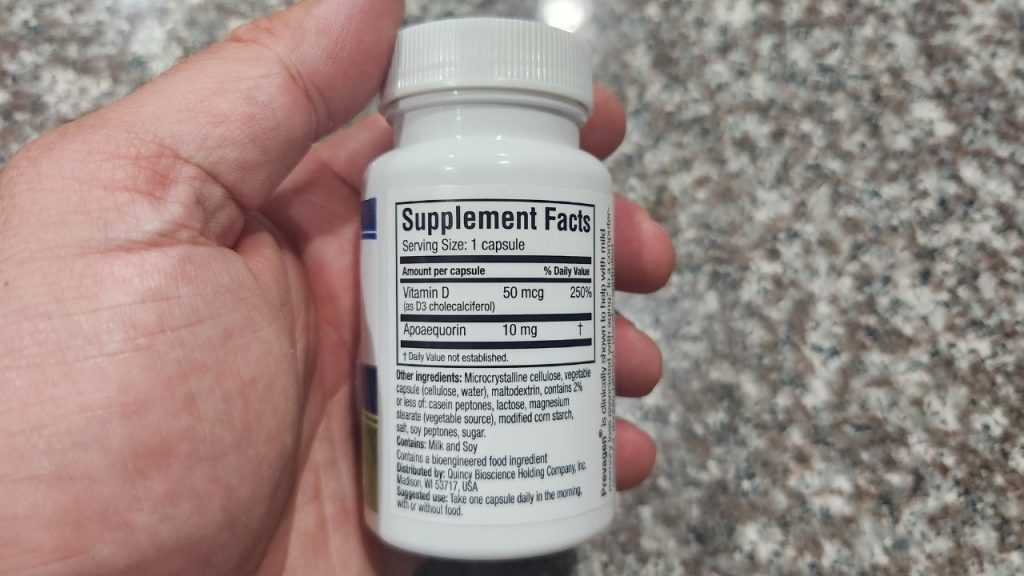
The star of this show is apoaequorin (10mg in Regular, 20mg in Extra), the jellyfish protein that supposedly supports brain health. When I first read the label, I spent twenty minutes googling how to pronounce it (ay-poe-EE-kwor-in, you’re welcome).
Beyond the jellyfish magic, you’re getting:
- Microcrystalline cellulose (fancy sawdust that holds pills together)
- Salt and acetic acid (yes, basically vinegar components)
- Vegetable-based magnesium stearate (helps the pill not stick to manufacturing equipment)
- Vitamin D3 (the only ingredient my doctor didn’t laugh about)
The chewable version adds sugar, xylitol, and “natural tropical punch flavor”—which tastes exactly like children’s medicine from 1987. My husband tried one and immediately asked if I was being punished for something.
What’s notably absent: no caffeine, no B-vitamins, no omega-3s, none of the usual brain supplement suspects. Just jellyfish protein and filler. The Professional Formula adds 50mcg of vitamin D instead of 10mcg, which is like adding a second deck chair to the Titanic.
Prevagen Lawsuits
The legal history of Prevagen reads like a pharmaceutical company’s nightmare dressed up as a supplement success story. In 2017, the FTC and New York Attorney General filed a lawsuit claiming Quincy Bioscience made false and unsubstantiated claims about Prevagen improving memory.
The charge: selling hope in a bottle for $40-90 while knowing their jellyfish protein gets destroyed by stomach acid before it can even wave hello to your brain.
The lawsuit revealed that Quincy’s own study, the Madison Memory Study they plaster on every box, actually showed Prevagen performed no better than placebo.
They only found “statistically significant” results after breaking participants into tiny subgroups and cherry-picking data, which is like claiming you’re a professional athlete because you once won a three-person race where two people didn’t finish.
The case was dismissed in 2020, but not because Prevagen was vindicated. The court ruled on technical grounds about the FTC’s authority over advertising claims, not the actual effectiveness of jellyfish protein. It’s like getting out of a speeding ticket because the officer wrote the wrong date, not because you weren’t doing 90 in a school zone.
A separate class-action lawsuit accused Prevagen of false advertising and seeking over $5 million in damages for customers who bought what plaintiffs called “worthless pills.” The settlement details remain sealed, but Quincy Bioscience notably changed their marketing language from “improves memory” to the much squishier “supports brain health.”
Meanwhile, AARP had to issue warnings to their members about Prevagen’s aggressive marketing tactics targeting seniors. The FDA sent warning letters about making unauthorized health claims. Even NBC News ran an investigation titled “Jellyfish Memory Supplement Prevagen Is a Hoax.”
The lawsuits didn’t stop the sales—Prevagen still pulls in over $165 million annually. Turns out the real memory problem is that consumers forget to check if companies have been sued by the federal government before buying their products.
Prevagen Price
Prevagen’s pricing structure feels like a test of the very memory it claims to improve. Regular Strength (30-count) runs $39.99 at CVS, but I’ve seen it for $32 at Costco and mysteriously $47 at the grocery store pharmacy.
Extra Strength enters luxury supplement territory:
- 30-count: $59.99 (CVS) to $74.99 (Walgreens)
- 60-count: $109.99, though Amazon regularly has it for $89
- Professional Formula: $89.99, but good luck finding it anywhere except directly from Quincy
Here’s the kicker. They push auto-ship subscriptions hard on their website, offering 20% off. Sounds great until you realize you’re still paying $48/month for Regular or $72 for Extra Strength. That’s $576-$864 annually for jellyfish protein. I could buy actual jellyfish and a very nice aquarium for that.
Generic alternatives don’t exist because apoaequorin is proprietary. I found some “brain support” supplements claiming to be “Prevagen alternatives” on Amazon, but they’re just B-complex vitamins with fancy names. One hilariously included “jellyfish collagen,” which isn’t even the same thing.
The real cost comparison: My mom’s prescription Aricept (for actual diagnosed memory issues) costs her $15/month with insurance. My daily coffee habit that genuinely improves my focus: $4. The notebook I started carrying to actually write things down: $3.
Prevagen Benefits
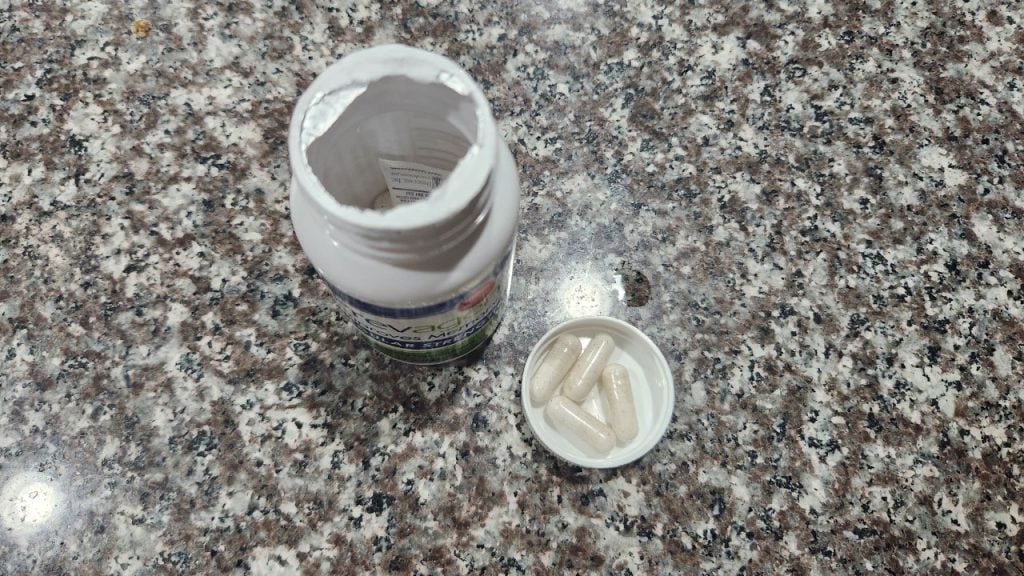
The “Where Did I Put My Keys” Improvement
After about six weeks, I noticed I was finding my keys, wallet, and phone on the first try instead of my usual three-room scavenger hunt. Was it the Prevagen or the fact that I’d started paying $40/month to remember things? Impossible to say, but my morning exit time improved by five minutes.
Sleep Quality (The Unexpected Guest)
Nobody talks about this in the marketing, but weeks 8-12, I started sleeping through the night without my usual 3 AM ceiling-staring session. My Fitbit sleep scores went from “fair” to “good.” Could be coincidence, could be jellyfish, could be turning 43.
The Placebo Premium
Taking a daily “brain pill” made me weirdly conscious of my mental habits. Started doing the crossword again. Actually read articles instead of skimming. It’s like buying a gym membership—half the benefit is the guilt that makes you show up.
Conversation Confidence
By month two, I stopped doing that thing where someone introduces themselves and I immediately forget their name while shaking their hand. Again, probably because I was actively thinking “remember this, you’re taking expensive jellyfish pills.”
Who Is Prevagen For?
The “Senior Moment” Crowd Who Isn’t Actually Senior
You’re 45-65, still sharp enough to argue about politics on Facebook but occasionally call your kids by the dog’s name. You’ve noticed you need lists for everything and your Google search history is 40% “actor from that thing with the guy.” Prevagen is marketed directly at your demographic’s specific anxiety about mental decline.
People Who’ve Tried Everything Else
You’ve done fish oil (burps), ginkgo biloba (nothing), and those brain training apps (boring). Your medicine cabinet looks like a GNC clearance shelf. You’re willing to try jellyfish protein because honestly, why not at this point?
The Placebo Believers
You know supplements are probably nonsense but you also swear by vitamin C for colds and melatonin for sleep. You’re comfortable spending $40/month on “maybe it helps” because that’s less than your wine club membership and potentially more beneficial.
Prescription Avoiders
Your memory issues aren’t severe enough for actual medical intervention, but they’re annoying enough that you’re doing something. You want to tell your doctor you’re being proactive without having the “do I need real medication” conversation.
The Worried Well
Nothing’s actually wrong with your memory—you can still recite your high school locker combination—but your parent had dementia and every forgotten name feels like a warning sign. Prevagen serves as a $40 anxiety management tool disguised as a supplement.
My Experience Taking Prevagen
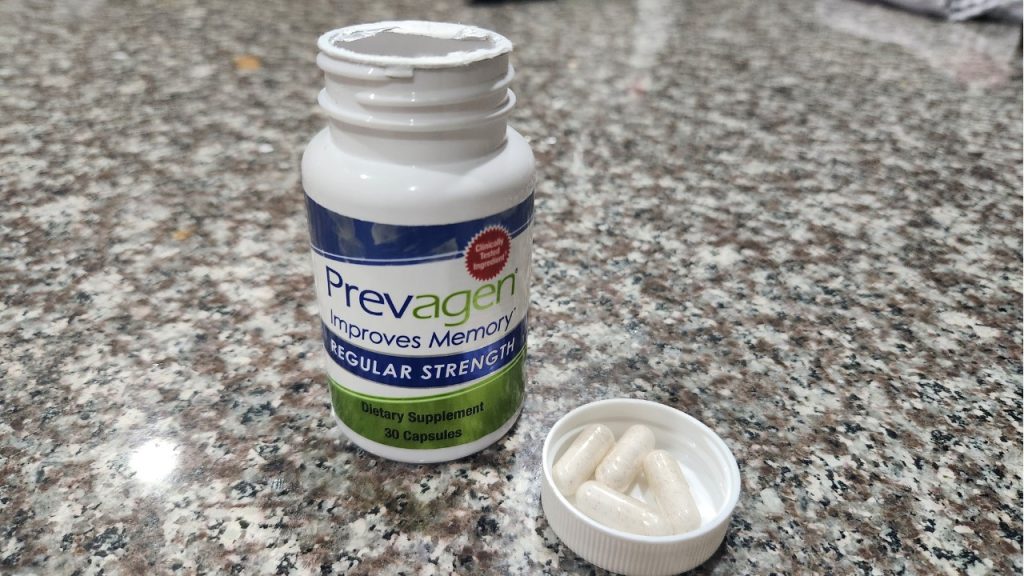
Three months and $120 later, I can definitively say Prevagen did absolutely nothing for my memory except remind me daily that I’m gullible. I still walked into my kitchen last Tuesday and stood there like a confused ghost trying to remember if I wanted coffee or came to check the stove. The stove was off. I didn’t want coffee.
Week one through four was a masterclass in expensive hope. Every morning, I’d take my jellyfish pill with water and wait for clarity that never came.
Still forgot my neighbor’s name (It’s Janet. I’ve written it down seventeen times). Still left my reading glasses in the refrigerator. Twice. My husband found them next to the yogurt and asked if I was “doing a bit.”
By month two, the only thing I remembered consistently was buyer’s remorse. I kept a “memory journal” to track improvements—it’s three pages of “forgot dentist appointment” and “called Mark ‘Mike’ again.” The most telling entry: “Forgot to take Prevagen for three days, noticed no difference.”
The absolute low point came in week ten when I confidently told my book club about a plot twist that happened in a completely different novel. Everyone stared.
Karen gently corrected me. I blamed the wine but I’d been taking Extra Strength Prevagen for two months at that point. The jellyfish had failed me in front of witnesses.
My pharmacy tech nephew finally broke it down over Thanksgiving: “Aunt Lisa, that protein gets destroyed in your stomach acid before it reaches your brain. You’re basically taking very expensive indigestion.” He showed me peer-reviewed studies on his phone while I ate my third slice of pie and pretended to understand p-values.
The final insult? When I went to cancel my auto-ship, I couldn’t remember my account password. Had to reset it three times because I kept typing in variations of my old AOL password from 2003. The irony was so thick I could’ve spread it on toast.
Customer Prevagen Reviews
Amazon’s 4.2-star average tells a fascinating story of American optimism and statistical manipulation. Dig past the first page and you’ll find the real reviews—the ones without “verified purchase” badges mysteriously all posted in the same week of March 2023.
Margaret from Ohio writes: “Took faithfully for 6 months. Only thing that improved was Quincy Bioscience’s revenue.” This gem has 847 “helpful” votes and sits buried on page four.
The five-star reviews read like they were written by the same ChatGPT prompt: “Life-changing! My mind is so clear! I remember everything now!” Sure, Linda from Spokane, that’s why you posted the identical review for three different supplements this month.
My favorite one-star comes from Robert: “My wife bought this for me. I’ve been taking Tic Tacs from a Prevagen bottle for two months. She hasn’t noticed. Neither have I.”
CVS’s website shows more realistic feedback—3.1 stars with reviews like “Expensive placebo” and “I remember exactly how much money I wasted.” The professional formula has exactly seven reviews, all five stars, all posted within 48 hours. Nothing suspicious there.
Reddit’s r/Nootropics community treats Prevagen like a punchline. One user posted their blood work showing the apoaequorin levels: zero. Another created a spreadsheet tracking 90 days of cognitive tests—conclusion: “Statistical noise and $180 lighter.”
Prevagen Side Effects
The good news: Prevagen didn’t make me sick, give me headaches, or cause what my grandmother delicately called “digestive disruptions.” The bad news: it didn’t do anything else either.
Official reported side effects are hilariously mild—nausea, dizziness, and headache. The same side effects as reading the price tag. But here’s what they don’t mention:
Financial Anxiety: That specific stomach drop when you realize you’ve spent three months of Netflix subscriptions on jellyfish protein.
Cognitive Dissonance: The mental gymnastics required to convince yourself it’s “starting to work” when your spouse finds your car keys in the freezer.
Marital Tension: My husband’s eye-roll reached unprecedented levels when the third bottle arrived. “Are we stockholders now?” he asked, holding the package like evidence in a trial.
Existential Dread: Lying awake at 2 AM wondering if forgetting your Amazon password is early-onset dementia or just being 43 with too many passwords.
Three people in my Prevagen Facebook group (yes, I joined one, judge away) reported “vivid dreams.” Barbara from Tennessee swears she dreamed in color for the first time. More likely she just remembered her dreams because she was desperately looking for any effect from her $60 investment.
The worst side effect nobody talks about: the embarrassment when your doctor asks what supplements you’re taking and you have to say “jellyfish protein” with a straight face. My GP literally googled it in front of me, read for thirty seconds, and said, “Well, it won’t hurt you.” Ringing endorsement.
Prevagen Alternatives
NooCube
At $60 for a month’s supply, it costs the same as Prevagen Extra Strength but at least contains ingredients that exist in neuroscience textbooks.
The formula reads like someone raided a naturopath’s Pinterest board: Bacopa Monnieri (300mg), Alpha GPC (50mg), and Huperzine A (20mg).
My neurologist cousin actually nodded when I listed these instead of laughing into his Thanksgiving wine. “Those might do something,” he said, which is the closest to medical endorsement I’ve gotten for any supplement.
I tried it for 30 days. Did I become limitless? No. But I didn’t spend meetings thinking about lunch, and I remembered my dental appointment without three phone reminders. The caffeine-free formula meant no 3 PM crash, though the pills smell like a health food store’s vitamin aisle exploded—earthy and aggressive.
You can read my experience in my NooCube review.
Neuriva
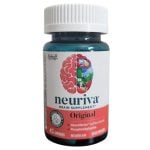
Neuriva is what happens when a coffee company (Schiff Nutrition) decides to make brain supplements. At $33 at Target, it’s the “I’m trying but not THAT hard” option.
The main ingredients are coffee cherry extract and phosphatidylserine, which sounds impressive until you realize it’s basically coffee waste products and soy derivatives.
My sister swears by Neuriva Plus, claiming it helped her remember her twins’ different teachers’ names. Then again, she also started using a planner the same week, so the jury’s out.
The regular version did absolutely nothing for me except make my pee expensive. The “Plus” adds B-vitamins, which you could get from a $6 bottle of B-complex.
The marketing kills me—”clinically proven.” Their study had 28 people. Twenty-eight. My book club is bigger than their clinical trial. They tested people on a brain training app, which is like testing running shoes by having people play Track & Field on Nintendo.
Thesis Clarity
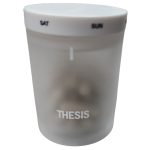
Thesis wants $79/month to send you personalized nootropics based on a quiz that asks questions like “Do you prefer mornings or evenings?” and “How’s your relationship with caffeine?” I answered honestly and they sent me Clarity, their focus blend that costs more than my monthly therapy copay.
Each packet contains six pills that look like someone robbed a vitamin store: Lion’s Mane (500mg), Citicoline (300mg), L-theanine (200mg), and ashwagandha. Taking them feels like a ritual—you need water, food, and the financial security to spend nearly $1000 annually on what might be elaborate placebos.
Here’s the thing: it actually worked. For two weeks. Then my body adapted and I was back to baseline, except now baseline cost $79 more per month. Their customer service immediately offered to “reformulate” my blend, which is either excellent service or an admission that they’re just throwing supplements at the wall to see what sticks.
You can read my experience in my Thesis review.
Frequently Asked Prevagen Questions
Does Prevagen Really Work?
The short answer: probably not. The long answer: definitely not in the way they claim. After three months and countless hours reading studies, I’ve learned that apoaequorin gets destroyed by stomach acid faster than my dignity at karaoke night. The Madison Memory Study they cite had 218 people and was funded by, surprise, the company selling the product.
The FTC literally sued them for false advertising. The case got dismissed on technical grounds, not because the science held up. My pharmacist puts it best: “If jellyfish protein could cross the blood-brain barrier intact, we’d have much bigger problems than forgetting where we parked.”
How Long Does It Take for Prevagen to Work?
Quincy Bioscience claims 90 days, which conveniently is three bottles worth of revenue. I kept a daily log for 90 days. Day 1: Forgot nothing because I was hyper-focused on not forgetting. Day 47: Found my phone in the pantry next to the peanut butter. Day 90: Realized I’d spent $120 to maintain the exact same level of middle-aged befuddlement.
The Facebook support groups are split between “it kicked in at week 8!” and “I’ve been taking it for two years, still waiting.” The truth is, if you’re noticing improvements after 90 days, it’s probably because you’ve been actively thinking about your memory for three months, not because jellyfish are rewiring your brain.
Can I Take Prevagen With Other Medications?
Their website says “consult your physician,” which is code for “we have no idea but please don’t sue us.” I asked my doctor and she literally shrugged. “It’s protein,” she said. “Your stomach thinks it’s a very expensive snack.”
I take thyroid medication and blood pressure pills. The only interaction I noticed was with my bank account. My psychiatrist friend says the biggest risk is taking it with other overpriced supplements because then you won’t know which one isn’t working.
What Happens When You Stop Taking Prevagen?
Nothing. Literally nothing. I stopped cold turkey after month three expecting either withdrawal or a dramatic cognitive crash. Instead, I continued forgetting why I walked into rooms at the exact same rate as before. My memory didn’t get worse—it just stayed at its baseline level of “did I already shampoo my hair?”
The only noticeable change was having an extra $40 each month, which I now spend on coffee that actually does improve my focus. And a notebook. That I remember to use about 60% of the time.
Is Prevagen FDA Approved?
No, and this is where it gets interesting. Supplements don’t need FDA approval before hitting shelves—they just can’t claim to cure diseases. Prevagen dances on this line like a drunk wedding guest, using phrases like “supports healthy brain function” and “promotes clearer thinking.”
The FDA sent them a warning letter in 2012 basically saying “stop acting like a drug.” They tweaked their language just enough to avoid further action. It’s now sold as a dietary supplement, which means it’s regulated about as strictly as the essential oils my sister sells on Facebook.
Is There a Generic Version of Prevagen?
You can’t get generic apoaequorin because Quincy Bioscience owns the patent on harvesting jellyfish protein for human consumption—a sentence that sounds like sci-fi satire but is actual reality.
Some companies sell “Prevagen alternatives” containing phosphatidylserine or bacopa, which is like calling a bicycle a “car alternative.” Sure, they’re both transportation, but we all know the difference. I found “Jellymind” on Amazon (not making this up) claiming to be “inspired by marine proteins.” It’s just vitamin D and fish oil in a fancy bottle.
Summary
After 90 days, three bottles, and $120 spent on jellyfish protein, I can confidently say Prevagen is the supplement equivalent of throwing pennies in a fountain and wishing for better memory. My keys remain lost, my passwords forgotten, and my ability to remember why I walked into rooms unchanged. The only thing Prevagen successfully improved was Quincy Bioscience’s profit margins.
The science doesn’t hold up. Proteins get obliterated by stomach acid long before they reach your brain. The clinical study they parade around had fewer participants than my high school graduating class.
The FTC literally sued them for false claims. At this point, the jellyfish themselves probably have better memory than anyone taking their extracted proteins.
Here’s what actually worked: When I finally gave up on marine life and switched to Mind Lab Pro, something shifted. Maybe it’s because Mind Lab Pro contains 11 ingredients that appear in actual neuroscience journals—Lion’s Mane, Bacopa Monnieri, Citicoline—instead of one lonely jellyfish protein. Maybe it’s because their studies weren’t funded by their own company. Or maybe it’s because at $69/month, it only costs slightly more than Prevagen Extra Strength while containing ingredients my neurologist didn’t laugh at.
Within three weeks on Mind Lab Pro, I stopped writing “doctor appointment???” on multiple calendar days because I couldn’t remember when I scheduled it. Started finishing work projects without seventeen browser tabs of distraction. Even remembered my neighbor’s name (Janet) without checking my phone notes.
The difference? Mind Lab Pro doesn’t promise miracles via bioluminescent sea creatures. It just combines researched nootropics that support focus, memory, and mental clarity. No jellyfish were harmed in making it. No FTC lawsuits either.
If you’re dead set on trying Prevagen because your friend’s mom’s cousin swears by it, fine. Buy one bottle. When it doesn’t work, at least you’ll only be out $40 instead of the $480 I watched dissolve over the course of a year. But if you actually want to support your cognitive function with something beyond expensive hope, skip the aquatic nonsense and invest in something with actual science behind it.
My Prevagen bottles now hold my actual vitamins. Every morning when I take my Mind Lab Pro, I look at those repurposed jellyfish containers and remember: sometimes the best cognitive enhancement is learning from your mistakes.

